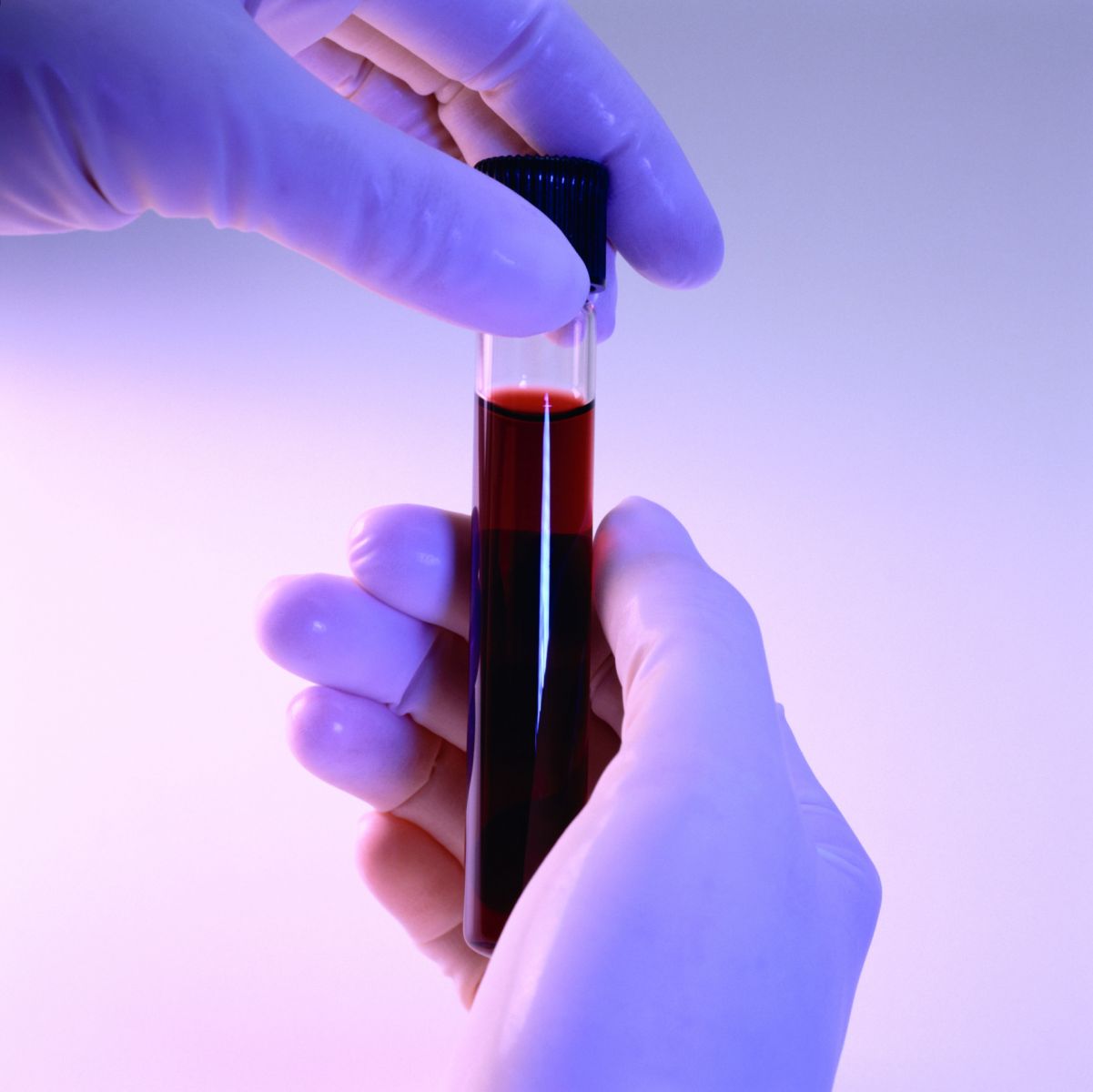Approximately 85 percent of people have Rh positive blood. This means that on the surface of their red blood cells there is a specific protein - rhesus. During pregnancy, a woman who does not have such a protein ( Rh negative), when a child inherits a positive factor from his father, a Rh conflict is possible.
To do this, the fetal red blood cells must end up in the mother’s blood, which can happen during pregnancy complications, invasive interventions, or abdominal injuries. The risk increases if this is not the first birth or if the pregnancy has been terminated. A woman’s body perceives children’s red blood cells as foreign proteins and triggers the production of antibodies against them.
Consequences of Rh conflict
With a high concentration of antibodies, the baby’s red blood cells are destroyed, the oxygen supply to tissues deteriorates, which leads to hypoxia, which primarily affects the brain and kidneys. In milder cases it is limited to anemia and “jaundice”; in severe cases, fetal death is possible.
Treatment hemolytic disease carried out by intrauterine blood transfusion and/or premature birth.
First and subsequent pregnancies
During the first pregnancy, if it proceeds without complications, Rh conflict usually does not arise. M-type, large, do not enter the fetus and do not harm it. But during the birth itself, the baby’s red blood cells can enter the mother’s bloodstream, and if there are enough of them, the mechanism for producing G-antibodies will be triggered. This happens in approximately 10% of cases, and then during the next pregnancy with a positive Rh factor of the embryo, conflict is inevitable.
If the pregnancy was terminated or there was a miscarriage for more than eight weeks, then the appearance is also possible. This is due to the fact that the fetus is already producing its own red blood cells, and they can enter the woman’s blood.
Prevention and anti-Rhesus immunoglobulin
Treatment of developed rhesus conflict requires highly qualified doctors, sophisticated medical equipment and does not provide guarantees to avoid negative consequences for the health and development of the baby. Therefore, prevention is necessary, which is simple and accessible, although it requires strict implementation of all recommendations.
For prophylaxis, human anti-Rh immunoglobulin is used; it is produced from donors and contains passive Rh antibodies. The principle of operation is based on the simultaneous presence of foreign Rh proteins and passive immunoglobulin antibodies in the blood, which blocks the launch of the mechanism for the production of its own active antibodies.
Indications for use during pregnancy
 The instructions for the drug contain all the necessary information. Convert special attention required for indications for use:
The instructions for the drug contain all the necessary information. Convert special attention required for indications for use:
- Rh negative in the mother;
- Rh positive at the father's;
- lack of production of Rh antibodies in the mother.
Only if all three conditions are present simultaneously can immunoglobulin be used for prophylaxis during pregnancy.
At the initial visit to the antenatal clinic, a blood test is done for the Rh factor; if the result is negative, the pregnant woman is placed on special registration. carried out once every two weeks, at the end of the term weekly. Their presence in small quantities is not critical, but a sharp increase indicates the development of Rh conflict. For prevention, it is necessary to administer an intramuscular dose of immunoglobulin at 28–29 weeks; the second vaccination is given after birth if the newborn is Rh positive.
- intravenously;
- with a high level of antibodies in the blood, i.e. after the onset of the Rhesus conflict;
- children.
Indications for use in other cases
Immunoglobulin should also be used in women with negative Rhesus
- after childbirth, if the child is Rh positive;
- after termination of pregnancy.
The injection is given within 2 hours after the event, up to 48–72 hours is acceptable. In these cases, immunoglobulin ensures the normal course of the next pregnancy, suppressing the possible triggering of the mechanism for the production of antibodies against the Rh protein.
- after abdominal injuries during pregnancy;
- with ectopic pregnancy;
- after invasive (microsurgical) interventions;
- for infections, diabetes, pregnancy complications with the risk of fetal red blood cells entering the mother's bloodstream.
Application Notes
 For medical reasons, the antenatal clinic should give the injection at 28 weeks of pregnancy free of charge. A standard dose compensates for the entry of 15 ml of red blood cells or 30 ml of whole blood into a woman’s bloodstream. Available in vials or syringes. Before use, the solution is kept at room temperature for 2 hours. An open bottle is used immediately and is not stored.
For medical reasons, the antenatal clinic should give the injection at 28 weeks of pregnancy free of charge. A standard dose compensates for the entry of 15 ml of red blood cells or 30 ml of whole blood into a woman’s bloodstream. Available in vials or syringes. Before use, the solution is kept at room temperature for 2 hours. An open bottle is used immediately and is not stored.
Selection of immunoglobulin
There are several types of anti-Rhesus immunoglobulin on the market, which differ in name, manufacturer and price:
- HyperROU S/D, USA
- Partobulin SDF, Austria
- KamROU, Israel
- Rezonativ, Austria
- BayRoadie, USA
- Immunoro, Russia
- Human immunoglobulin Antirhesus, Russia
The opinions of doctors and user reviews on websites do not give a clear answer as to which immunoglobulin is better; everyone has arguments for and against. Imported drugs are considered to be of higher quality, their price is correspondingly higher, but the active ingredient is the same for all.
Anti-Rhesus immunoglobulin is a drug that is a protein fraction from the blood of Rh-immunized people. The main components of anti-Rhesus immunoglobulin are antibodies against the human Rh factor.
It is a proven fact that if the antigen (in in this case- Rh factor) and antibodies to it enter the body almost simultaneously, then sensitization of the body (production of its own antibodies) does not occur.
The introduction of anti-Rh immunoglobulin in situations where there is a high probability of Rh-positive red blood cells entering the bloodstream minimizes the risk of developing Rh conflict in the future.
Indications for taking Anti-Rhesus immunoglobulin
According to the instructions for Anti-Rhesus immunoglobulin, the drug is administered to Rh-negative pregnant women and postpartum women (if born Rh positive child), as well as women with an interrupted pregnancy of any location.
The timing and dose of administration of Anti-Rhesus immunoglobulin are determined individually and depend on the presence of factors that increase the risk of fetal blood entering the maternal body (threat of miscarriage, abdominal trauma, some therapeutic and diagnostic procedures, and others).
Usual timing of drug administration in uncomplicated pregnancy and low factors risk - 28 and 32 weeks, as well as the first three days after birth.
Contraindications to taking Anti-Rhesus immunoglobulin
The drug is not administered to women with Rh- positive blood; women who have had laboratory tests of the presence of Rh antibodies in their blood during pregnancy.
Before administering anti-Rhesus immunoglobulin to postpartum women, the Rh status of the child is determined. If the newborn is Rh negative, administration of the drug is not required.
In the blood of Rh-positive people there is a specific protein that is found on red blood cells. 15% of the world's population are Rh negative, because they do not have this protein. The Rh factor is an individual trait that is inherited, but it does not affect human health in any way.
Typically, Rhesus status must be determined together with the blood group in the laboratory.
What is Rh conflict?
This phenomenon worries women with Rh negative blood. During pregnancy, conflict may arise between mother and fetus, provided that the child has inherited Rh positive blood from father.
Normally, the blood of mother and fetus never mixes, but placental abnormalities and trauma can cause fetal red blood cells to enter the woman’s bloodstream. Upon reaching a certain “concentration threshold” immune system the mother begins to produce antibodies against the foreign protein (this is the Rh factor on the fetal red blood cells) for destruction, i.e., destruction of the fetal blood. As a result, this occurs in the child. Sometimes the conflict can be so strong that defects appear nervous system.
The likelihood of developing such a phenomenon is not so high; the first pregnancy (if there are no pathologies) most often ends well, but each subsequent pregnancy increases the risk of developing a conflict by 10-15%.
Antibodies can also form during miscarriage, Caesarean section and placental abruption. The likelihood of sensitization depends on the number of fetal red blood cells that enter the mother's body.
How to prevent Rh conflict?
Although Rh conflict does not pose a danger to the health of the mother, the consequences of hemolytic disease for the baby are very serious, so it is worth preventing this phenomenon in all women who have blood that is Rh negative.
So, all pregnant women are prescribed a blood test for early stages pregnancy to determine rhesus. The further algorithm of actions depends on the situation.
Usually the first pregnancy proceeds normally. Throughout the entire period, it is necessary to determine the woman’s anti-Rhesus level. Up to 32 weeks, blood is checked once a month, up to 35 weeks - 2 times a month, and then every week. There shouldn't be any antibodies yet. If a Rh-positive child is born, then the mother must be given the drug "Anti-Rhesus Immunoglobulin" in the first 72 hours after birth. This measure does not allow the appearance of antibodies to the Rh factor. This is necessary for the preservation and normal course of subsequent pregnancy.
If an abortion, miscarriage occurs, or this is also an indication to administer Anti-Rhesus Immunoglobulin.
A conflict regarding the Rh factor in the first pregnancy may be associated with previously transfused positive blood to a woman who is Rh negative.
How does the drug "Anti-Rhesus immunoglobulin" work?
The substance prevents the formation of antibodies to the Rh factor, and therefore the occurrence of hemolysis of red blood cells in the fetus.
Most often, the baby's blood enters the mother's bloodstream during childbirth, so the administration of the drug "Anti-Rhesus Immunoglobulin" is indicated for the woman immediately after the birth of the baby. This measure is not taken for this child, but helps prevent the development of hemolytic disease during the next pregnancy. At the discretion of the doctor, the drug can also be administered at 28 weeks of pregnancy if there is a risk of mixing the two bloods before birth.
Anti-Rhesus immunoglobulin is contraindicated in cases of detected sensitization (presence of antibodies to the Rh factor in the blood of a pregnant woman), children, and women with Rh-positive blood. It cannot be administered intravenously. The dosage depends on the amount of blood (namely red blood cells) that enters the mother’s body.
Anti-Rhesus immunoglobulin allows a woman with Rh-negative blood to have as many children as she wants.
Pregnancy can be complicated not only by changes in the body, which are caused by the load on all organ systems, but also by the woman’s Rh factor.
Pregnant women are at risk. It is believed that in this case there is a possibility of developing dangerous pathologies that can lead to the death of the mother and fetus.
To exclude such disorders, doctors suggest injecting anti-Rhesus immunoglobulin.
Anti-Rhesus immunoglobulin: pros and cons
The drug is used to prevent problems with the birth of subsequent children if the mother has an Rh conflict with the fetus. The danger lies in the possible death of the child due to increased number of antibodies. This process can lead to placental rejection.
During the first pregnancy, such a conflict arises extremely rarely, but the second and subsequent ones are already complicated.
Doctors themselves cannot say unequivocally how safe and necessary immunoglobulin is. A competent gynecologist first refer the patient to an immunologist, who will make a final diagnosis and draw up an adequate treatment plan.
Doubt about the need for injections also lies in the fact that previously women had never injected themselves with such drugs and at the same time carried more than one baby. To finally determine the need for the procedure, you should carefully check the antibody titer and condition of mother and child. Immunoglobulin should never be injected into newborn children.
Side effects of the drug
Like any drug, anti-Rhesus immunoglobulin has a number of dangerous side effects. The most common of these is increased body temperature up to +37.5 degrees. Usually this symptom goes away on the first day after the injection. In some cases, the patient develops a dangerous allergic reaction, including anaphylactic shock. After the injection, it is imperative to monitor the patient’s reactions for the first hour and, if necessary, give her antihistamines and carry out antishock therapy.
Instructions for use
Release form
The drug is available in liquid form. Designed for intramuscular injections. Every 0.5 ml of medicine contains 300 mg of active substance, a small amount of glycine and purified medical water. The maximum dose in the body after the injection accumulates by the end of the first day, and the drug is eliminated within one month.
Indications for use
- The birth of an Rh-positive child if the mother is different Rh negative blood. The injection is carried out immediately after the baby is born.
- Forced or initiated by a woman termination of pregnancy. In this case, the indication for injection is positive Rh factor father of the fetus.
If a woman has allergic reactions to any substance or medication, she should definitely undergo additional consultation with a good allergist. If a child is born With negative Rh factor , administration of immunoglobulin is not required.
Directions for use and dosage
Before administering the drug, it is imperative to wait for it at least two hours outside the refrigerator. Immunoglobulin is collected using a strictly sterile needle with a wide eye. This will prevent foam from forming. If for some reason the ampoule was opened and stood on the table for some time, it should be thrown away. The remedy is introduced strictly intramuscularly.
- The drug must be administered to a woman who has given birth. in the first three days after the completion of the birth process.
- When performing an abortion, the drug is administered immediately after the procedure is completed.
- At a titer of 1:2000, one dose of the drug is administered in an amount of 300 mg active substance.
- At titer 1: 1000 you should enter two doses in one shot.
It should be understood that if for some reason the immunoglobulin was administered to a woman before childbirth, it is still worth injecting again in the first three days. Usually the medication is injected at week 28, if there is a real indication for it. Injections are allowed at 32 weeks. If the woman in labor received medicinal product in previous pregnancies, after giving birth to her no need to enter anything.
Interaction with other drugs
The drug is in no way does not affect absorption other medicines. If necessary, it can be administered even to women who have additionally been prescribed strong antibiotics and powerful anti-inflammatory drugs.
When treated with immunoglobulin, you do not need to adhere to a diet, take additional medications or change your lifestyle. After the injection, the woman can continue feed your baby breast milk.
Average price
The drug has a high price. Only some women can afford immunoglobulin, as the cost of the drug varies from 7 to 20 thousand rubles. The most expensive immunoglobulins are supplied by the USA and Italy. Some pharmacies provide discounts when purchasing multiple injections. Doctors prescribe at least one injection to women.



